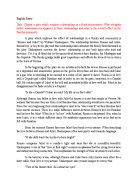William Shakespeare is a famous play writer from the 1500's. Most of his plays were tragedies and usually involved rich, lucky, powerful characters full of prosperity at the start and usually included a hero. By the end of the plays the hero would have made an act of courage and love and the characters who were rich and powerful had usually had a downfall. Although Shakespeare had his plays preformed in many different venues, nearly all of Shakespeare's plays were performed in the Globe which was a theatre in London. As many of the guests were standing, usually the poorer less educated people referred to as the groundlings, Shakespeare had to make sure his plays were interesting and drew people in right from the start.
The first scene of any play is extremely important and the Shakespearian tragedy 'Romeo and Juliet' is no different. As in any first scene, 'Romeo and Juliet' plays across many different story lines and characters to the audience thus keeping them engaged and interested. It creates tension and lost of action and by the end of the scene there are many unanswered questions. It also includes amusement for the groundlings.
The groundlings usually needed humour to keep them thoroughly entertained.
The first scene of 'Romeo and Juliet' introduces humour when two Capulet servants are stood talking. ''Ay the heads of the maidens or the maidens heads take it in what sense you wilt.'' This is a play on words, a double entendre, as the more educated audience would hear the literal sense, to cut of the heads of the maids, and the lesser educated people/groundlings would understand the much deeper sexual connotation, to take the maidens virginity. The jokes created by the two characters, Sampson and Gregory, are coarse jokes with sexual connotations. Again, all this bad humour is aimed towards the groundlings as it is easy to understand and keeps their attention.
The first scene of any play is extremely important and the Shakespearian tragedy 'Romeo and Juliet' is no different. As in any first scene, 'Romeo and Juliet' plays across many different story lines and characters to the audience thus keeping them engaged and interested. It creates tension and lost of action and by the end of the scene there are many unanswered questions. It also includes amusement for the groundlings.
The groundlings usually needed humour to keep them thoroughly entertained.
The first scene of 'Romeo and Juliet' introduces humour when two Capulet servants are stood talking. ''Ay the heads of the maidens or the maidens heads take it in what sense you wilt.'' This is a play on words, a double entendre, as the more educated audience would hear the literal sense, to cut of the heads of the maids, and the lesser educated people/groundlings would understand the much deeper sexual connotation, to take the maidens virginity. The jokes created by the two characters, Sampson and Gregory, are coarse jokes with sexual connotations. Again, all this bad humour is aimed towards the groundlings as it is easy to understand and keeps their attention.







